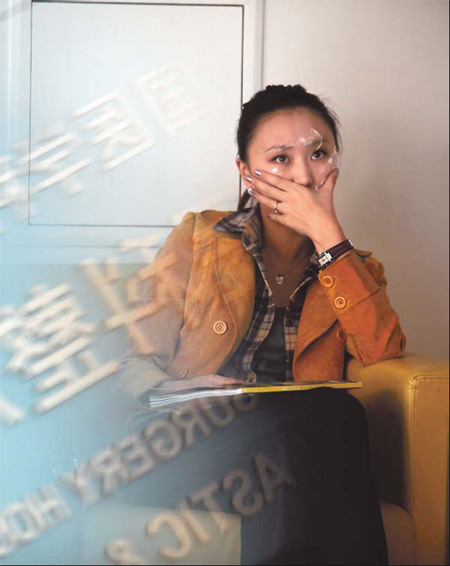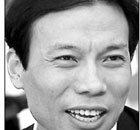Top Stories
Botched cosmetic surgery stories prompt warning
By Du Guodong (China Daily)
Updated: 2010-04-30 07:54
 |
Large Medium Small |
|
A customer waits for her turn for plastic surgery at a hospital in Beijing. [Wang Jing / China Daily] |
Following a spate of recent plastic surgery horror stories, surgeons are warning potential patients to use officially accredited hospitals instead of private beauty parlors.
The note of caution followed a recent case in which a Beijing woman, surnamed Zhang, suffered a serious postoperative infection following a facelift.
Zhang is now seeking 138,300 yuan in compensation from a doctor named Hou, who is with the biological technology research institute under the Ministry of Health.
Zhang claims that a facelift operation carried out in her home on Jan 15 left her physically and mentally unable to return to work because of unsightly infected wounds on her head.
Experts warn that the market for plastic surgery in China, and especially in cosmopolitan cities such as Beijing, is booming as people go under the knife in a bid to get an advantage in their personal lives and at work.
But the strong demand has led to the opening of a burgeoning number of private clinics and beauty parlors looking for a slice of the potential revenue.
As the number of such institutions has mushroomed, so too has the quantity of poorly run clinics with inadequate facilities and unqualified personnel.
The phenomenon has led to a sharp rise in the number of medical disputes involving the plastic surgery industry.
According to statistics from the China Consumers' Association, there were 2,970 complaints about medical procedures last year and 13,375 complaints about cosmetology and hairdressing. Both groups of complainants contained a large number of people who underwent unsuccessful plastic surgery operations.
Statistics from the Beijing-based Plastic Surgery Hospital of the Chinese Academy of Medical Sciences (CAMC) show breast implants, facelifts and liposuction were the most popular procedures.
According to Ding Xiaobang, director of the Plastic Surgery Hospital of CAMC, Beijing has witnessed a growing market for cosmetic operations and customers have increased year-on-year since 1999.
"There are currently several hundred institutions offering plastic surgery in Beijing and most of them are private beauty parlors," Ding told METRO. "They perform hundreds of thousands of operations every year.
"Beijing is one of the places that has the highest rate of plastic surgery operations.
"I perform about 40 such operations every month and many of those are on young females who do not live in the capital."
Ding said private beauty parlors are not reliable and are responsible for 90 per cent of failed operations and legal disputes.
"Generally speaking, official hospitals are up to par and few big failures occur in them each year, but for the numerous beauty salons that claim to have a ready-made panacea for all types of plastic surgery needs, customers should sharpen their eyes," said Ding.
According to an advisory report by consultants with China Commodity Marketplace that looked at the prosepcts for China's plastic surgery industry between 2010 and 2015, the industry is in line for more growth.
The sector was worth 100 billion yuan last year - a rise of 85 percent on 2008 - and will grow to 300 billion yuan in the next five years.
With so much money at stake, Zheng Guobin, a senior plastic surgeon with CAMC, said more legislation is needed to regulate the chaotic market.
"There is still much to be desired in the area of legislation, including market access and the annual evaluation of related institutions and the qualifications of practitioners," Zheng said. "We have a long way to go to make this sunrise industry more mature."








